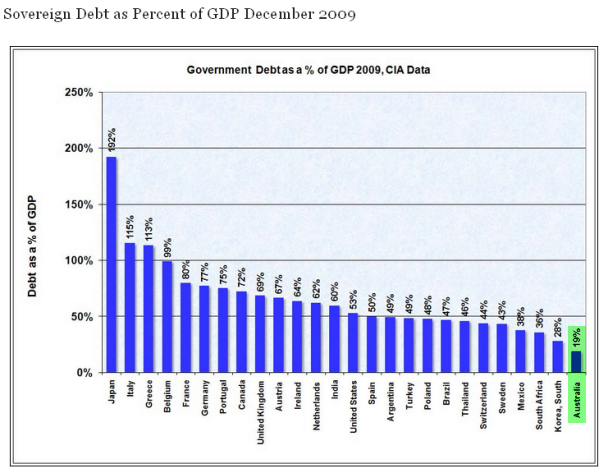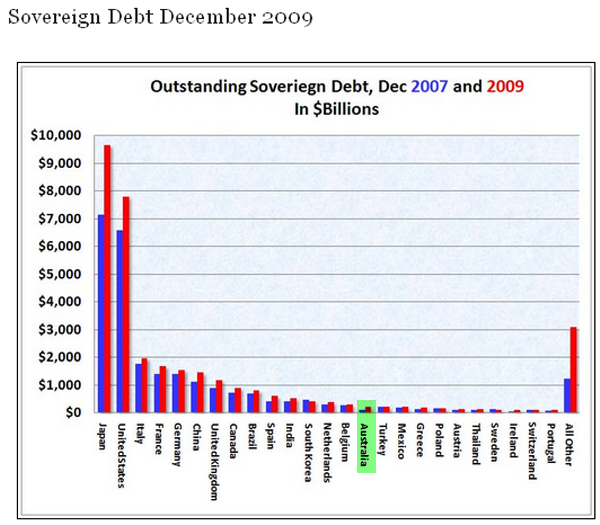An election campaign without an election date. Australians might not know when the election will be but the campaigning is clearly underway. Prime Minister Julia Gillard is crisscrossing the country at a frenetic pace having chosen to make this a longer campaign than any we have had for many decades.
Her immediate predecessors have tended to go out on the election trail for the statutory minimum period as they remember how Bob Hawke nearly came unstuck back in 1984 by giving his opponents extra time. With the advantage of novelty on her side as the new girl, Ms Gillard can probably afford to take the risk but a risk it certainly is.
Expect to see this graph in a Labor ad. Joe Hockey still keeps hammering away at the need to curtail government spending so presumably the Opposition believes that governments having budget deficits frightens the people.
Which is why Labor should do its best to get across to voters just how much better off Australia is than most other nations in the world. This graph from the Calculated Risk website helps put things in perspective:

And compared with these other developed countries the growth in Australian government debt because of the world financial crisis has been minuscule:

Keep Collingwood winning. I know this will be hard for Julia Gillard to stomach but she really must start hoping that Collingwood keep winning. The very success of her election campaign may depend on it. The very latest research on voting behaviour shows that a win by a high attendance or championship football team on the eve of a political election results in the incumbent party gaining an additional 2.42 percentage points and 2.30 percentage points respectively.
With the Magpies having the biggest following in the AFL, and the Prime Minister’s Bulldogs virtually bereft of supporters apart from oddballs like First Dog on the Moon, the message from the Californian academics Andrew J. Healya, Neil Malhotrab and Cecilia Hyunjung Mob is clear: hope that the Colliwobbles do not reappear until after polling day.
And if Labor wants to retain those seats in the outer west of Sydney start praying that the Penrith Panthers keep on their winning rugby league way. As for the Government’s chances in Queensland, things are grim with the Brisbane Broncos not in the eight and the Townsville based North Queensland Cowboys languishing near the bottom of the table.
And before the sceptical Crikey readership dismiss this advice as irrelevant nonsense I draw attention to the peer reviewed Proceedings of the National Academy of Sciences of the United States which has just published the study Irrelevant events affect voters’ evaluations of government performance that describes how voters’ personal sense of well-being — as determined by events that are unrelated to political and economic affairs—affects their evaluations of their elected representatives.
Why they fought so hard. Rio Tinto chief executive Tom Albanese confirmed overnight why the major miners fought so hard against the planned super profits tax. It was not just about what Australia had planned but that what Mr Albanese calls “resource nationalism” would spread with other countries following the lead and demanding a greater share of the proceeds from what mining companies dig out of the ground.
Governments around the world, he told a mining industry function in London, will seek to boost their share of mining profits, potentially constraining supply.
“They will want to increase their revenue share. They will want to have more control of who develops their natural resources. And this resource nationalism could, by itself, limit the supply response to stronger demand.”







Not so quick, Green Machiners! The Canberra Raiders may congratulate themselves on being higher on the NRL ladder than someone – anyone – else. But the mighty Gold Coast Titans are currently 4th!
Admittedly there aren’t many marginal federal seats on the ‘Coast, but don’t overlook BrisVegans temporarily adopting the ‘Coast when things aren’t going too well in town.
Thanks for the Calculated Risk graphs BUT…..
You seem to have missed something the Coalition won’t have and that is the much greater percentage rise in Australia’s sovereign debt between 2007 and 2009. That will enable the Coalition to push the line (correct by and large) that what is relatively good about Australia’s position is an inheritance from the Howard government.
Also the Coalition will no doubt use a competing graph which is headed “Australia’s sovereign debt small? Oh yeah! Look at this” after which follows a graph showing Australia’s overall foreign indebtedness right up, proportionally, with Mexico, Brazil et al.
I don’t know that a government which doesn’t have a clear lead in reputation for competence will be wanting to insist on the busy voter having lots of confusing stuff with competing implications thrust before her.
Must get back to calculating the margins available for close observers of the same….
@Jim Webb…wheres the documentation to back up your claims, or are you hoping the Opposition will rush in and make it for you? Don’t expect ‘Sloppy Joe’ to provide anything that is remotely to do with finance, he is out of his depth deciding if he will or wont stop the stimulus spending, which is another matter worth looking at. Talking of staying out of recession?
@ David
Jim Webb’s some sort of prentice banker isn’t he? Probably on the golf course where his IPhone has to be turned off so let’s try and see what he might answer.
If you look at the chart above which is headed “Sovereign Debt December 2009” you can see what he means on the proportionate increase bit. Australia has increased its sovereign debt much more, proportionately, than other countries. It’s obvious when you think of it because Costello made such a point of pride about paying off government debt. I checked with a bit of Googling and this link
http://www.scribd.com/doc/25734670/Reinhart-Rogoff-Growth-in-a-Time-of-Debt
shows the same so that even Tubby Joe could understand.
As to the private debt I haven’t found anything as easy to find and neat but I can’t believe the Coalition won’t be happy to shamelessly wheel out the Debt Truck if provoked. Isn’t it notorious that Australia’s non-government borrowing is up with the Mexicos and Brazils? You do the Googling and show me up (or show Mr Webb up anyway) if you can. It is certainly notorious that our banks have to borrow on the wholesale debt market overseas in tens, even hundreds, of billions to be able to lend to Australian home buyers and businesses unless I have missed such a miraculous turn around in our domestic savings rate that everything has changed since the government was lending its AAA rating to the banks.